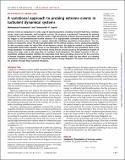| dc.contributor.author | Farazmand, Mohammad M | |
| dc.contributor.author | Sapsis, Themistoklis P. | |
| dc.date.accessioned | 2018-03-01T20:56:03Z | |
| dc.date.available | 2018-03-01T20:56:03Z | |
| dc.date.issued | 2017-09 | |
| dc.date.submitted | 2017-05 | |
| dc.identifier.issn | 2375-2548 | |
| dc.identifier.uri | http://hdl.handle.net/1721.1/113905 | |
| dc.description.abstract | Extreme events are ubiquitous in a wide range of dynamical systems, including turbulent fluid flows, nonlinear waves, large-scale networks, and biological systems. We propose a variational framework for probing conditions that trigger intermittent extreme events in high-dimensional nonlinear dynamical systems. We seek the triggers as the probabilistically feasible solutions of an appropriately constrained optimization problem, where the function to be maximized is a system observable exhibiting intermittent extreme bursts. The constraints are imposed to ensure the physical admissibility of the optimal solutions, that is, significant probability for their occurrence under the natural flow of the dynamical system. We apply the method to a body-forced incompressible Navier-Stokes equation, known as the Kolmogorov flow. We find that the intermittent bursts of the energy dissipation are independent of the external forcing and are instead caused by the spontaneous transfer of energy from large scales to the mean flow via nonlinear triad interactions. The global maximizer of the corresponding variational problem identifies the responsible triad, hence providing a precursor for the occurrence of extreme dissipation events. Specifically, monitoring the energy transfers within this triad allows us to develop a data-driven short-term predictor for the intermittent bursts of energy dissipation. We assess the performance of this predictor through direct numerical simulations. | en_US |
| dc.description.sponsorship | United States. Office of Naval Research (grant N00014-15-1-2381) | en_US |
| dc.description.sponsorship | United States. Air Force. Office of Scientific Research (grant FA9550-16- 1-0231) | en_US |
| dc.description.sponsorship | United States. Army Research Office (grant 66710-EG-YIP) | en_US |
| dc.publisher | American Association for the Advancement of Science (AAAS) | en_US |
| dc.relation.isversionof | http://dx.doi.org/10.1126/sciadv.1701533 | en_US |
| dc.rights | Attribution-NonCommercial 2.0 Generic (CC BY-NC 2.0) | en_US |
| dc.rights.uri | https://creativecommons.org/licenses/by-nc/2.0/ | en_US |
| dc.title | A variational approach to probing extreme events in turbulent dynamical systems | en_US |
| dc.type | Article | en_US |
| dc.identifier.citation | Farazmand, Mohammad, and Themistoklis P. Sapsis. “A Variational Approach to Probing Extreme Events in Turbulent Dynamical Systems.” Science Advances 3, no. 9 (September 2017): e1701533. | en_US |
| dc.contributor.department | Massachusetts Institute of Technology. Department of Mechanical Engineering | en_US |
| dc.contributor.mitauthor | Farazmand, Mohammad M | |
| dc.contributor.mitauthor | Sapsis, Themistoklis P. | |
| dc.relation.journal | Science Advances | en_US |
| dc.eprint.version | Final published version | en_US |
| dc.type.uri | http://purl.org/eprint/type/JournalArticle | en_US |
| eprint.status | http://purl.org/eprint/status/PeerReviewed | en_US |
| dc.date.updated | 2018-02-09T18:16:45Z | |
| dspace.orderedauthors | Farazmand, Mohammad; Sapsis, Themistoklis P. | en_US |
| dspace.embargo.terms | N | en_US |
| dc.identifier.orcid | https://orcid.org/0000-0003-0302-0691 | |
| mit.license | PUBLISHER_POLICY | en_US |
